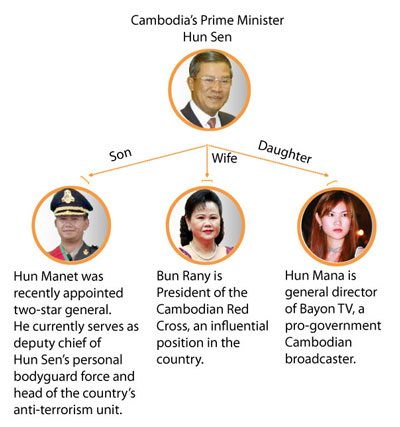




Cambodia's Prime Minister Hun Sen has made his fast-rising son a two-star general amid pressure to reform the country's tainted military.
Hun Manet, a West Point graduate with a doctorate in economics, was appointed deputy infantry commander-in-chief in the Royal Cambodian Armed Forces (RCAF).
He currently serves as deputy chief of his father’s bodyguard unit as well as head of the anti-terrorist unit at Cambodia’s Ministry of Defense.
A key challenge facing Hun Manet is reforming the Cambodian military, which has been accused of human rights abuses by various organizations and the U.S. State Department.
Phil Robertson, deputy director of the Asia division at Human Rights Watch in Bangkok, said Hun Sen’s bodyguard unit itself was involved in rights abuses and that Hun Manet faces an enormous challenge in any bid to clean up the military's tarnished image.
“He should … take on the human rights record of the RCAF because many of the units in the RCAF have abused human rights. So if he wants to take this on as a personal mission or as an objective in order to reform the Cambodian military, we would welcome that,” Robertson said.
“But we want to see some action, we don’t just want to hear words. We would want to see clear evidence that there are reforms taking place and that persons who have been responsible for human rights abuses are held accountable,” Robertson said.
Stepping stone
Outspoken Cambodian opposition MP Mu Sochua said she feels the appointment is temporary and a stepping stone for a "higher position," adding that Hun Manet might not seriously consider restructuring the infantry.
“I don’t oppose the promotion of Hun Sen’s son, because he is qualified for the job, but I’m concerned that he has too many positions,” said the parliamentarian for Kompot province.
According to New York-based Human Rights Watch, Hun Sen's personal bodyguard unit has been linked to a deadly March 1997 grenade attack on the political opposition.
Aside from the charge, various Cambodian military units have been accused of summary executions, arbitrary detentions, political violence, torture, illegal logging, and farmland seizures, Human Rights Watch said.
"Cambodian military personnel are not held accountable for serious rights violations. Instead, Hun Sen has promoted military officers implicated in torture, extrajudicial killings, and political violence," the rights group charged on its website last year.
Hun Sen, 58, is the longest-serving leader in Southeast Asia, having ruled Cambodia since 1985. Observers have long speculated, according to local newspaper The Phnom Penh Post, that Hun Manet is being groomed as a potential successor.
Executive director of the Khmer Institute for Democracy Hang Chhaya said that Hun Manet's promotion is “part of the prime minister’s attempt to consolidate power in politics,” the Post reported.
Family involvement
